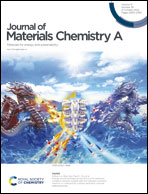A self-descaling Janus nanofibrous evaporator enabled by a “moving interface” for durable solar-driven desalination of hypersaline water†
Abstract
Solar-driven desalination by using porous evaporators has been deemed to be a sustainable pathway to obtain freshwater. Despite the emerging anti-scaling evaporators, the durable evaporation in hypersaline water remains a formidable challenge because of the unpreventable salt accumulation in the porous structures. To enhance the descaling capacity of evaporators, a self-descaling Janus evaporator (SJE) featuring a “moving interface” is developed for durable and efficient desalination of hypersaline water. This evaporator consists of an Fe3O4-embedded poly(N-isopropylacrylamide) (PNIPAM) nanofibrous layer and a hydrophilic polyacrylonitrile (PAN) nanofibrous layer constrcuted by sequential electrospinning. Integrating the photothermal conversion of Fe3O4 and the thermal responsiveness of PNIPAM, the SJE exhibits a reversible solar-induced wettability transition from asymmetric wettability (under sunlight) to hydrophilic wettability (at night). Under sunlight, the top surface and the evaporation interface (i.e. air–water interface) are separated to prevent salt accumulation on the evaporator, benefiting efficient solar steam generation. At night, the air–water interface moves to the upper surface, showing the self-descaling ability. With this design, the SJE exhibits a high-efficiency water evaporation rate of 1.76 kg m−2 h−1 under one sun and demonstrates long-term stability (over 5 days) when treating 20 wt% NaCl solution. Overall, this work provides an exciting material solution with photothermal responsive design for the practical application of Janus evaporators in brine desalination.



 Please wait while we load your content...
Please wait while we load your content...